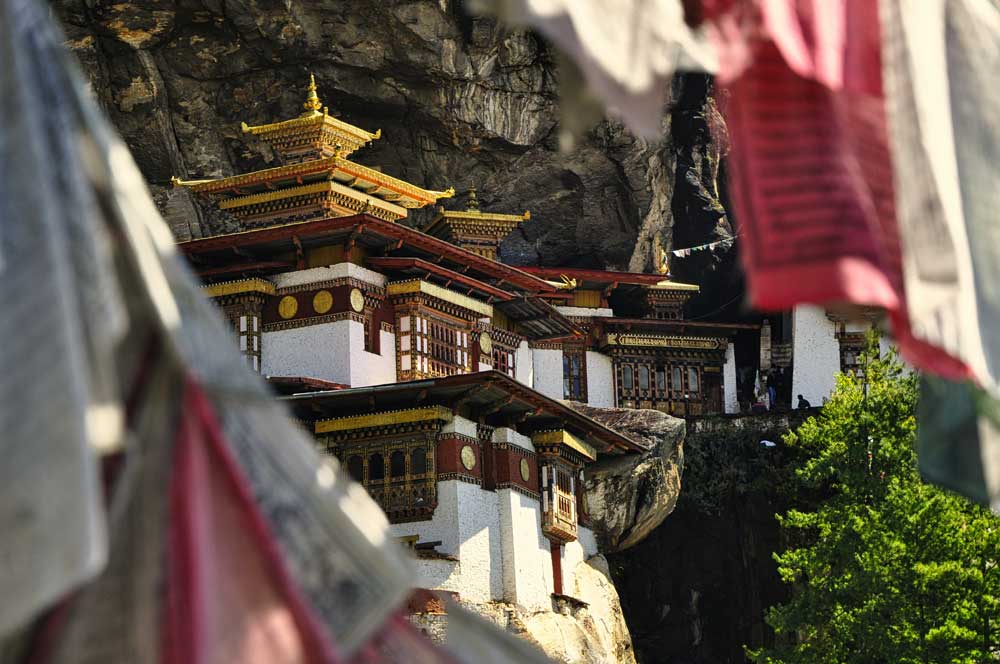
Bhutan is the number one happiest country in the world because it has something that no other country has. It has successfully developed and implemented Gross National Happiness (GNH), which was conceptualized in 1972 and officially became part of Bhutan’s constitution in 2008. GNH prioritizes the goal of maximum happiness for its citizens and leads the country in whichever direction it needs to go to achieve this important goal.
In this way, Bhutan has challenged the conventional wisdom by redefining and rediscovering what it takes to be happy, as many other countries blindly follow an old, flawed, and outdated model of happiness, which focuses on optimizing socio-economic factors such as consumption, materialism, and the amount of money a person has.
However, numerous studies have repeatedly shown the limits and dangers of an excessive focus on purely economic factors such as countless preventable problems related to sustainability concerns, public health challenges, and a growing mental health crisis. On the other hand, Bhutan’s investment in Gross National Happiness (GNH) ensures that its citizens receive what they actually need to maximize their long-term happiness, challenging what governments and corporations may try to make us believe leads to happiness.
Bhutan’s happiness-first policy is flexible and adaptable to the country’s needs. If money is necessary for happiness, Bhutan is willing to invest in it. However, if money becomes an obstacle to happiness, Bhutan is willing to prioritize other metrics that bring greater happiness to its population.
This focus on national well-being has brought Bhutan great success in terms of well-being of its citizens, but also it has also made Bhutan a leader, consultant, and widely recognized as the happiest country in the world. Many other countries turn to the Bhutanese government for guidance on increasing the well-being of their own citizens. Countries like Canada, the United States, and the European Union are among those seeking Bhutan’s assistance.
To this extent, today we will explore:
- Factors that make Bhutan the happiest country in the world,
- How GNH contributes to this goal,
- Why the old model of happiness is not working, and
- Why other countries are looking to Bhutan as a prime example of happiness.
Is Bhutan Happier Than Finland?
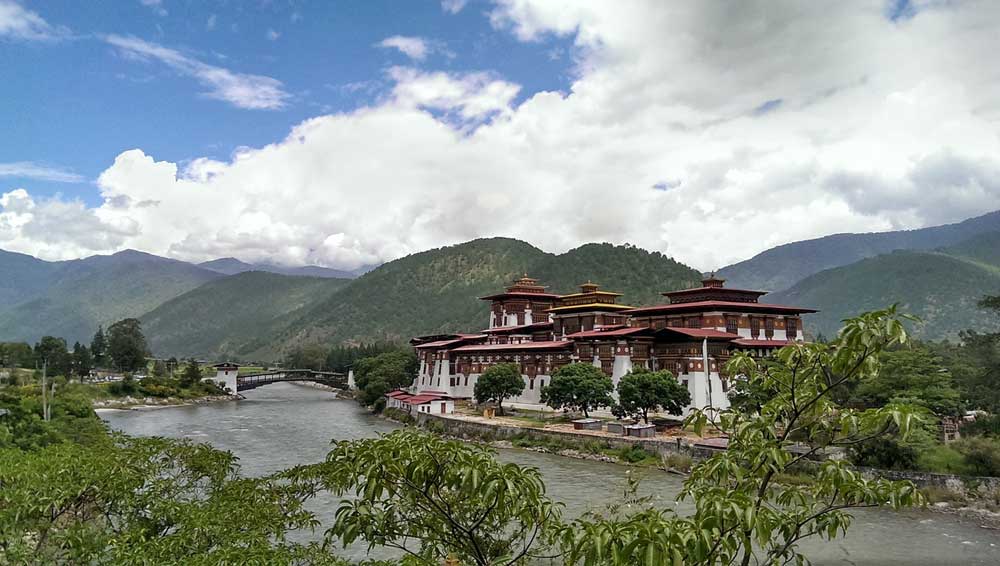
According to the World Happiness Report (WHR), the happiest country in the world is Finland, not Bhutan. However, the WHR has long been criticized for primarily focusing on a country’s economic well-being, assuming that more money leads to more happiness, respectively measuring national well-being with metrics such as Gross Domestic Product (GDP) per capita.
Based on this economic measurement, the World Happiness Report (WHR) ranks Bhutan as the 95th happiest country in the world. This ranking is primarily due to the fact that Bhutan is not as wealthy as most other countries. However, it is important to note that this statistic can be misleading as it is solely based on socio-economic factors such as:
- Income
- Healthy life expectancy
- Having someone to count on in times of trouble
- Generosity
- Freedom and trust, and
- Absence of corruption in business and government
However, WHR does not measure other important factors, such as:
- How much people smile,
- How much they actually enjoy their lives,
- Social inclusion,
- Overall health of population,
- Lack of psychological issues such as stress, anxiety, and depression,
- National levels of suicide, and more.
If these factors were considered, Bhutan’s ranking would be much higher, and Finland would no longer be the number 1 the happiest country in the world, losing its 4 year leading title.
The Happiest Country in the World on the World Stage
Moreover, Finland is not the leading voice on the topic of happiness on the international stage – Bhutan is. This is why economies all over the world are looking to the 95th happiest country in the world for advice on how to effectively implement policies that will improve their citizens’ well-being and happiness. Unfortunately, many countries have made irreversible decisions that make it impossible to become a country like Bhutan, while Bhutan is still claiming that it can be like any other country in the world.
Luckily, Bhutan is interested in making the whole world as happy as possible. It does not exclusively focus on its own citizens, but it seeks to improve the lives of everyone else too. Bhutan recognizes that we all live in an increasingly interconnected world where everyone’s decisions affect the lives of everyone else.
The government of Bhutan has taken the initiative to spread the word about the importance of happiness and its positive effect on the economy, offering its several-decade-long experience to anyone who will listen. From hosting the World Happiness Summit to launching the Gross National Happiness Index, Bhutan is doing its part to make the world a better place for everyone.
Happiness-Centered Model of Economy
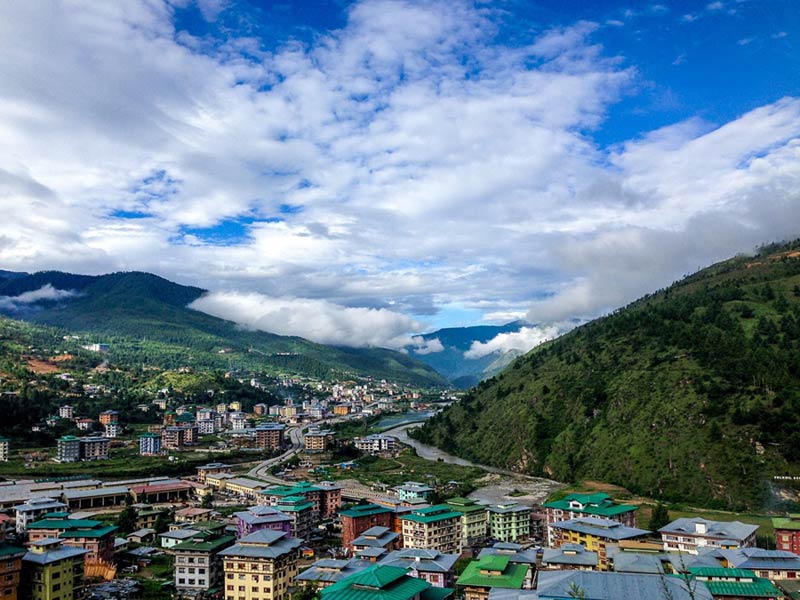
Richard Easterlin, a professor of economics at the University of Southern California, confirms the urgent need to move away from a money-centered model of the economy towards a happiness-based model. He states that economic growth has failed to make us happier since the 1950s.
He has shown that there is a limit to the positive impact of economic growth on overall happiness, as money is particularly important for those who do not have access to basic necessities in life. However, beyond a certain point, the effect of money on our overall well-being levels off, and the continuous growth of happiness comes from other factors that may not be directly connected to personal wealth.
It is becoming increasingly clear that a holistic approach to development is necessary to ensure that nations are able to maximize their happiness. This approach must consider a range of factors and indicators, including economic growth, but also take into account other aspects such as access to healthcare, educational opportunities, and quality of life. Only through such an approach can we ensure that the world’s citizens are able to achieve their Optimal Happiness.
Bhutan and Happiness: What We Need to Know
If you want to travel to Bhutan today, you will need to pay a very hefty price of $200 per day to attract “high value, low volume” tourists to enter the country. Additionally, you will only be allowed to visit certain places accompanied by a tour guide. Bhutan is very strict in terms of preserving its natural beauty, resources, and culture.
Bhutan is a breathtakingly beautiful country located in the southern part of the Himalayan Mountains. It is home to approximately 4.3 million people who speak the primary language of Lhoka. In 1976, Bhutan officially joined the United Nations (UN) and has since become one of the most progressive and innovative members, particularly in regards to sustainable development, human rights, refugees, gender equality, and sustainable economic development.
Thanks to these policies, Bhutan has earned the well-deserved title of “the Happiest Country in the World,” as recognized by the BBC News series, “The World’s Happiest Countries.” This is largely attributed to the unique Gross National Happiness (GNH) index that Bhutan uses to measure the well-being of its citizens. The GNH index takes into consideration four key dimensions:
- Good governance,
- Sustainable socio-economic development,
- Cultural preservation, and
- Environmental conservation.
All of these factors are considered when making decisions that benefit the country and its citizens.
What sets Bhutan apart is its emphasis on promoting a healthy and fulfilling lifestyle for its citizens. Policies such as free healthcare, free education, and the preservation of the environment are all part of what makes Bhutan successful in achieving its goals. By looking at Bhutan as an example, other countries can learn from their success and strive to create a better world for their citizens. Bhutan serves as a shining example of what is possible when a country prioritizes the well-being of its citizens.
Bhutan is the Happiest Country in the World According to GNH
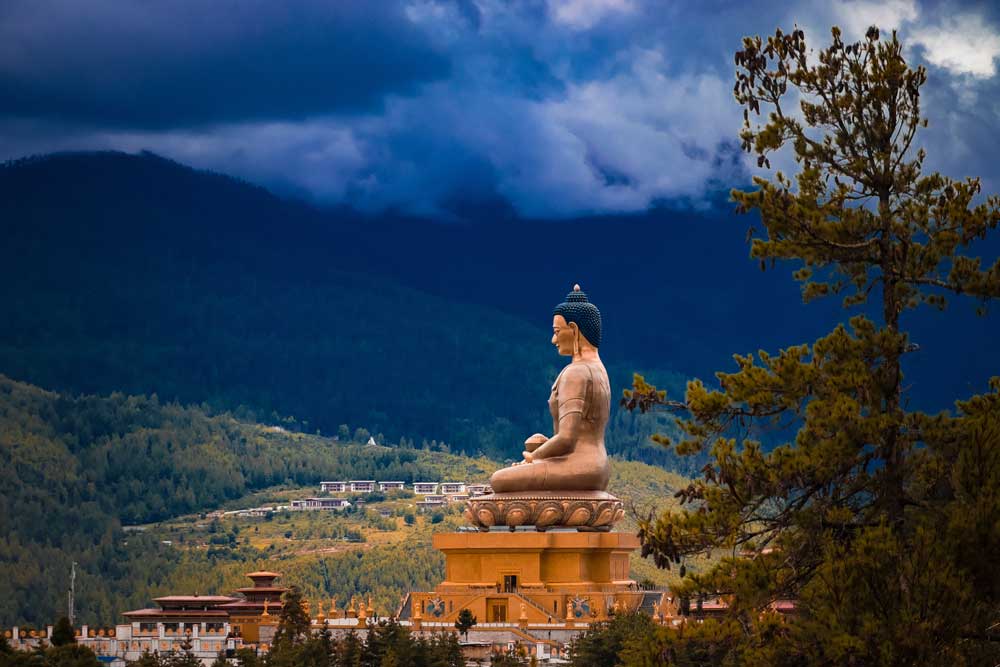
Bhutan has been on a mission to replace Gross Domestic Product (GDP) with a more meaningful metric to measure a country’s level of happiness and, in response, has developed the Gross National Happiness (GNH) score. This score is calculated by subtracting the global rank of the country from its total score, with the highest score being 100. Bhutan has worked hard to identify areas of economic policy that would contribute to this new model of social growth and has invested heavily in these areas.
After a few decades of investing in GNH, Bhutan has been recognized as the happiest country in the world according to the GNH model. This score was calculated using data from Gallup World Poll surveys, which interviewed more than 15,000 people from each country. Bhutan’s average GNH score is 7.59, which is the highest among all other countries, with the next highest being 7.62 and the lowest being 5.36.
This indicates that Bhutan has a relatively high level of happiness, but this can vary depending on factors such as location, living conditions, and culture. Bhutan has set an example for the world that happiness should not be measured solely by economic gains but should be based on the holistic well-being of its citizens.
Bhutan’s Human Development Index (HDI)
Bhutan’s Human Development Index (HDI) is a valuable measure of the well-being of countries around the world. In 2017, the United Nations Development Programme (UNDP) released the HDI to provide an objective measure of the quality of life in different nations. The HDI score was calculated by considering:
- Life expectancy at birth,
- Educational rates among children under 15 years old,
- Per capita income, and
- The availability of clean drinking water and sanitation facilities.
In comparison to other Asian countries, Bhutan had an impressive score of 829 points, 117 points higher than the scores of Nepal (627 points), Bangladesh (531 points), and Thailand (531 points). This suggests that Bhutan has a relatively high level of well-being. However, it is important to take into account that Bhutan’s score did not meet the UNDP criteria for gross national income or GDP.
Gross national income or GDP is the money earned by a nation’s economy based on how much goods are sold versus how much they are produced or the labor employed to make goods or services available in the market. This could explain why Bhutan’s HDI score is lower than other countries in the region, despite its relatively high level of well-being.
Impact of Religion on Bhutan’s Happiness
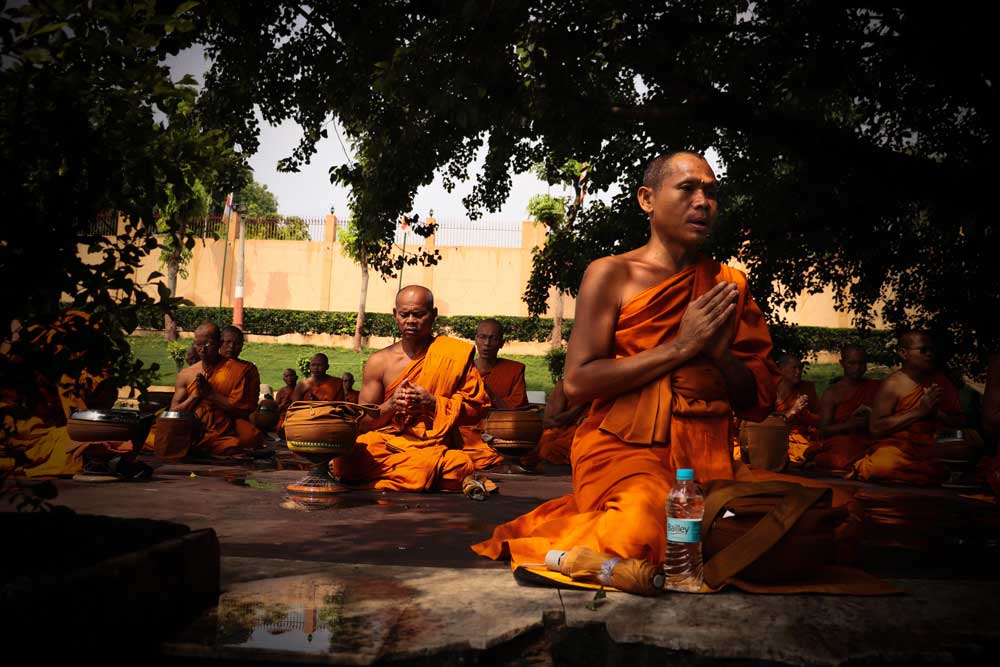
Bhutan has a long history of Buddhist practices. Buddhism, also known as a “religion of happiness,” is a major source of national identity and is deeply intertwined with the Bhutanese way of life. It is estimated that two-thirds of the country’s population are Buddhist. Buddhism provides spiritual guidance and a moral compass for Bhutanese citizens.
The teachings of Buddhism are widely accepted in Bhutan, and it is seen as a way to achieve inner peace and happiness. Buddhism emphasizes that happiness comes from within and that it is not dependent on material wealth. Bhutanese citizens are encouraged to pursue spiritual and material development in balance.
Buddhist principles of compassion, non-violence, and respect for all life forms are deeply ingrained in Bhutanese culture. For example, it is a cultural norm to show respect to elders, to practice compassion towards all living creatures, and to be honest and truthful.
Buddhism also provides an ethical framework for decision-making, which helps promote national happiness. The teachings of Buddhism emphasize the importance of harmony and cooperation and highlight the importance of taking responsibility for one’s actions. By following these teachings, Bhutanese citizens can be mindful of their actions and ensure that they are leading lives that are beneficial to themselves and others, which in turn affects national happiness.
Promoting Happiness, Sustainability, and Growth
The country has implemented a range of initiatives to reduce poverty and inequality while also protecting its environment and promoting economic growth. To further enhance these efforts, Bhutan has implemented a number of innovative policies and practices to promote sustainability.
To reduce poverty and inequality, Bhutan has heavily invested in rural infrastructure to improve access to education, healthcare, and other essential services for its citizens. The country has also undertaken initiatives to improve access to quality education, such as the “Education for All” campaign. Additionally, Bhutan has launched initiatives to modernize its educational systems and provide digital literacy skills to its citizens.
In terms of healthcare, Bhutan has made significant progress in providing universal healthcare coverage and access to essential medicines and medical facilities. Initiatives like the “Healthy Bhutan” campaign have been launched to promote healthy lifestyles and preventative healthcare, with the aim of reducing chronic diseases and improving health literacy.
Moreover, Bhutan has made great strides in renewable energy and sustainable development. The country actively invests in green energy technologies, including wind energy, geothermal energy, and biomass energy. Bhutan’s “Green Economy” policy focuses on preserving its forests and maintaining its natural resources. To further promote sustainability, Bhutan has implemented climate change mitigation measures, such as a carbon tax, and has established protected areas.
Bhutan: The Land of Untouched Beauty
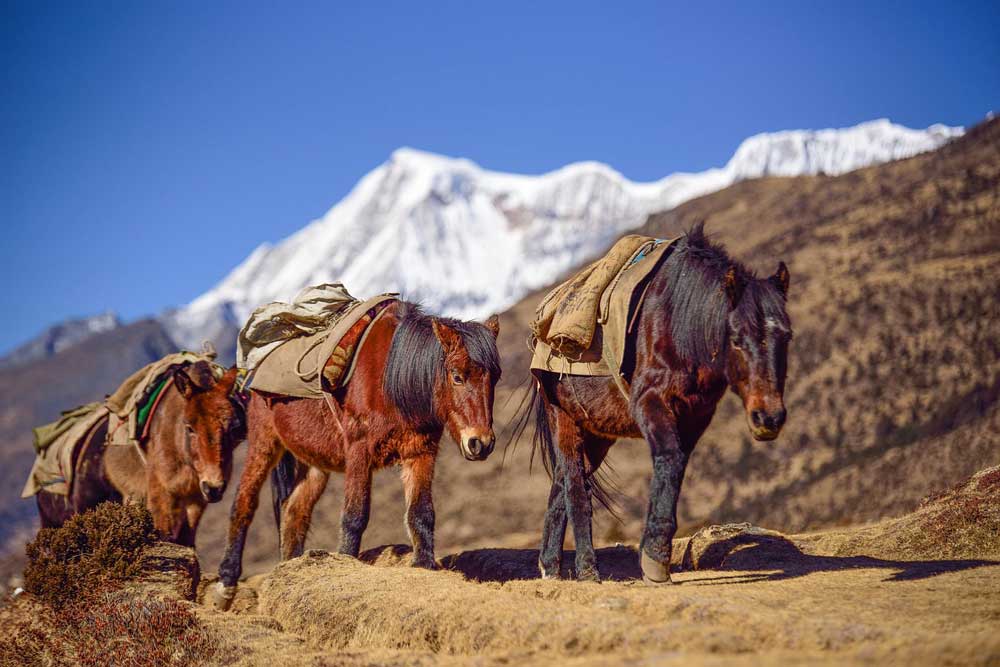
Bhutan is renowned for its stunning natural beauty, boasting over 100 national parks, including Gopeng and Tashiding, which are home to snow leopards and ibex (hardy goats). The country also offers a wealth of trekking and mountaineering opportunities in its many mountains.
Bhutan has one of Asia’s longest dry seasons, when temperatures drop below freezing for an entire month. During this period, farmers do not cultivate their crops. Instead, they pick wild herbs and vegetables. This means that Bhutanese food is wholesome, unprocessed, and healthy, with no added salt or sugar. Most hot drinks are plain water or tea with a few spices added to make it more palatable.
When you visit Bhutan, you won’t need to ask for directions. You will simply follow your nose and your intuition once you get there. You’ll find yourself captivated by its beauty, culture, and traditions. From breathtaking views of snow-capped mountains framed by lush valleys to fascinating cultural traditions and sacred monasteries, Bhutan has something to offer everyone.
For the adventurous, there are plenty of hiking routes, white-water rivers, pristine lakes, and rivers teeming with life. You can also take advantage of the many local shops, eateries, and markets, where you can sample some of the country’s delicious cuisine. No matter what your interests, you’ll find something to love about Bhutan.
Leading Happiness Charge by Example
The success of Bhutan has not gone unnoticed by the rest of the world. In recent years, more and more countries have begun to implement similar strategies and policies to promote a healthier and happier lifestyle for their citizens.
Additionally, more and more countries are beginning to recognize the importance of mental and emotional well-being. By introducing strategies such as meditation, mindfulness, and yoga, countries can help their citizens reduce stress levels and promote positive mental health.
By looking to Bhutan as an example, other countries can learn from its success and strive to create a better world for their citizens. Bhutan has proven that it is possible to create a society that is prosperous, happy, and environmentally conscious. This reinforces the idea that with the right strategies and policies in place, we can create a happier world for everyone.











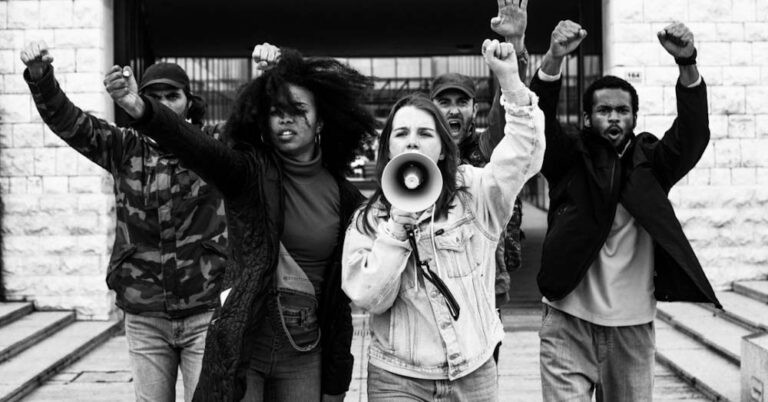




33 thoughts on “Bhutan is the Happiest Country in the World? Why is it #1?”
it appears to be 25% funded by grants from India
From what I know, Bhutan is a very small economy compared to India. Considering India’s interest in maintaining stability in the region and good relationships with its neighbors, I wouldn’t be surprised if Bhutan receives grants from India. But then again, many economies are interconnected, and I’m sure that it is better for Bhutan to receive a grant from India than from some other economy that isn’t as interested in Bhutan’s well-being.
This rad post made me think about a guy flying a kite years ago. The biggest kite I’d ever seen, and on it was something to the effect of, “kite string $4, graphite rods $11, nylon fabric $8, smiles….priceless”. Thanks Roman, hope is a gift I value immensely.
Thanks again Benjamin for reading and interacting with my blog! Your input makes me think and contributes to better content on this website!
Very nice and inspiring article.
You may want to read my blog on Bhutan as well.
Thank you for kind words. Will do it immediately.
True
Thank you @V.Aaradhyaa!
What an interesting read! Thank you for sharing this Roman.
Thank you for reading @Ebruli :)
So Bhutan has the highest rank of 7.59, and the next highest is 7.62?
Do you realize 7.62 > 7.59?
Well spotted, I will review and adjust this. Thank you
Great read. Thank you for sharing.
Thank you for reading and liking enough to comment :)
According to an app I have, “in Bhutan they say contemplating death five times daily brings happiness.” So the app sends me five random reminders per day that I’m going to die. Random, because death is random. It helps me to take life less seriously. I’m not plugging anything so won’t mention the name of the (free) app unless asked.
Wow, that’s an interesting perspective. I can see its value on a practical level, but I also question the value of consistently thinking about something negative. After all, there is already enough negativity in our lives, so why add more? While some people may be motivated by negative events, others may be negatively impacted by them, so personally, I would not recommend focusing on thoughts of death, especially 5 times a day.
Additionally, overstimulation is a significant issue in today’s world, with our attention constantly being hijacked and bombarded. This can have a negative impact on our happiness and well-being. Given this, my recommendation would be to minimize stimuli and embrace physical and digital minimalism. One practical step would be to turn off notifications, pop-ups, newsletters, reminders, and other distractions, and instead focus solely on your core goals.
I hope I’m not overstepping by providing somewhat “negative” feedback (in the sense that I critique what you are saying), but this is actually part of a larger happiness formula that I teach on this blog, so I hope you take my words in good faith!
Understood, in this case, indeed there are people who have a growth mentality even in the face of negative events, and they often see negativity as a challenge they want to overcome or “prove wrong.” They live their lives to the fullest because they are aware of their mortality, so death becomes a positive motivator rather than something that defines them negatively and brings them down. However, these cases are rare and this mindset can be difficult to cultivate. Therefore, it may require some effort for someone to shift their perception of something from negative to positive, but if you have this, that’s great! I believe that Steve Jobs was a prime example of this mindset, as well as many other famous individuals who share this perspective, although I can’t currently recall specific names. Nevertheless, I appreciate this discussion as I already want for some time to writing another blog post on this topic so this discussion helps!
I appreciate your point. If thoughts of death cause anxiety, they should be avoided. For me, they bring peace of mind. I remember that everything is temporary and savor each moment. It’s an opportunity to live mindfully. Eg. when I’m on vacation in a new locale, I enjoy each day thoroughly *because* my access to that place is temporary. Similarly, life is a vacation for me and when I’m reminded that it will end, I enjoy it even more and I take ordinary inconveniences less seriously.
I suppose it all depends on whether or not we view death as negative. I see it as a part of life, not as an end of life. I made my comment because supposedly, contemplating death is a Bhutanese tradition for happiness and it fit in with your informative article. I agree with your point — if it causes pain, it should be avoided.
What a great post! Very interesting and informative!
Thank you Nancy for your support!
This is a little confusing.
“Based on this economic measurement, the World Happiness Report (WHR) ranks Bhutan as the 95th happiest country in the world. This ranking is primarily due to the fact that Bhutan is not as wealthy as most other countries….” The World Happiness Report actually ranks countries based on the Cantril Ladder question that allows people to rank their life satisfaction on a 10-point scale. People in Finland believe their lives are much better than people in Bhutan according to this scale.
“Bhutan has earned the well-deserved title of “the Happiest Country in the World,” as recognized by the BBC News series, “The World’s Happiest Countries.”” This is not accurate. This BBC news series named Bhutan the 8th happiest country, and if you go to the ranking it is based upon, Finland is ahead of Bhutan.
But this ranking is mainly bullshit because it includes wealth etc. So, it is useless to use it either way.
“After a few decades of investing in GNH, Bhutan has been recognized as the happiest country in the world according to the GNH model.” Please offer a citation to this study.
Thank you for mentioning this. It’s nice to see that another expert is reading, discussing, and contributing with their knowledge. I will address this and reply as soon as possible.
Nice information
My big take away from your incredibly thoughtful article is, that while I may never see Bhutan, I can create a Bhutan mindset and spread it wherever I go! Thank you for this wonderful literary contribution.
Wow, that is a beautiful take on this, Janeen! You took my breath away with your words <3
Thank you so much for this comprehensive article.
So good to learn about other countries, especially happy ones!
Much appreciated
Thank you Yorinda! Of course, we are all learning from the best and refining their best practices. That’s the best way forward.
Thanks for this! I’ve copied the link to send to my daughter. Now I’m looking for how to follow you. So many thoughts, like the curse of founding an economy on the accumulation of money and things, failing the person behind the job or contest. And, by the way, thanks for “liking” my recent entry.
Thank you for reading, liking, and sharing my website. Indeed, the pursuit of happiness is very important for everyone, as many people are struggling with this exact point. I hope your daughter will also find it interesting and important. Accumulating money and possessions has indeed failed to make us happy, as despite living in one of the most economically abundant economies the world has ever seen, the answer seems to be not “more,” but rather “something else.” I try to address what this “something else” could be throughout this blog, but I also recommend getting my book where I compile all this knowledge.
I loved your blog, too! Keep on writing :)
Great article, thanks. Am currently exploring the concept of happiness as part of an MA I am doing. It’s fascinating to me that we have such as thing as a global happiness report which ranks countries against others. Not only do we know that comparing ourselves to others is detrimental to our general well being, as the disparities between rich and poor become more extreme, the measures used within it become nonsensicle. That said, we also know that no one can be happy all the time, no one should expect it to be a normal state of being, and it is only a feeling and a very personal one at that. There will always be light and dark, and recognising the differences and the contrasts helps us appreciate the times when we are ‘happy’ and finding the balance (as budhisum espouses) is key. The capitalist structues and systems which we live in bind us to economic drivers for so many important decisions, and I am interested to look at research into how one can dismantle them. It feels like a david and goliath challenge, but the theory that I think may help us all is the one of “enoughness”. If anyone has any thoughts on that, I would love to hear them!
Thank you for taking the time to write this. Indeed, the World Happiness Report (WHR) is biased in the way it addresses countries’ well-being by prioritizing financial well-being over other metrics. However, it is still better than nothing, as it at least brings attention to this challenge. I also believe that capitalism is responsible for a significant portion of our negative emotions, but dismantling it is more theoretical than practical at this point. While minimalism or “enoughness” is crucial, I am not very hopeful that a David will come along to challenge Goliath. I mean Bhutan can be the David, and it has created some social movement, but I don’t foresee it being able to take over as a dominant ideology in the near future.
Wow Roman, thanks for a very comprehensive article. I love bhutan fascinated in its culture, like their neighbour Nepal. Nicest people in the world! Wouldn’t it be amazing, if these principles could be applied through life in the west, more often!
I’ve been to Nepal. It’s indeed an amazing place. It’s like a small India, I’d say, as I’ve never been to Bhutan to make a comparison, although I’d love to go! It’s probably very untouched in many respects. I also hope that the principles of Gross National Happiness (GNH) in Bhutan can replace our excessive focus on increasing Gross Domestic Product (GDP), as it simply isn’t working lately. GNH is showing a lot of promise.